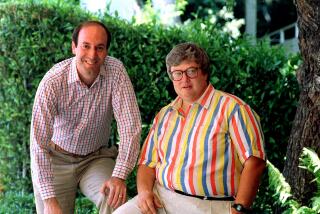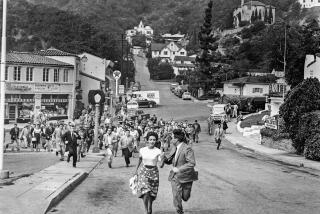Five unexpected ways Roger Ebert changed film journalism
- Share via
It’s hard to sum up one man’s achievements in any article or post. It’s even harder if that man is Roger Ebert, who in no particular order was critic, TV personality, social-media guru, blogger, scholar, screenwriter and advocate.
Still, there are some very quantifiable ways that Ebert, who died Thursday at age 70, changed film and film journalism. That’s true in very noticeable realms -- reviewing and supporting movies, and adding a remarkable voice to the criticism canon -- but in more subtle ones as well.
Here, then, are five hats Ebert wore that helped him leave his mark on cinema and journalism. It is, of course, hardly an exhaustive list.
PHOTOS: Roger Ebert - Career in Pictures
The hyphenate. It’s axiomatic -- if sometimes burdensome -- that newspaper journalists these days need divide their time between print, video and digital efforts. But it was hardly like that a quarter of a century ago. In an era when “multi-platform” still referred to, well, a variety of stages, Ebert was doing it all. He was a print critic for the Chicago Sun-Times, a TV personality for a popular public broadcasting/later syndicated show and eventually, with the rise of the Web, a prolific and popular blogging and social-media presence as well. Ebert understood intuitively what many of us came to understand only under duress: that the best way to spread our work was to make sure it was in as many places as possible.
FROM THE ARCHIVES: Star treatment sneaks up on film critic Roger Ebert
The populist. Before Ebert, there was plenty of smart film criticism. But movie-related essays could also be windy and inaccessible. Ebert, picking up in some ways on the democratic spirit of Pauline Kael (though with his own spin) was part of a movement to change all that. Using a direct and entertaining prose style, his nonetheless sophisticated print reviews (he was one of the first critics to win a Pulitzer Prize) ensured that people far away from film scholarship could understand and use the same analytical tools that critics did. And though his TV show could take some knocks -- it was predicated on conflict and the sometimes-maligned thumbs-up -- millions of people who wouldn’t pick up a newspaper review were suddenly learning the vocabulary of film criticism from the show. In a turn not often enough acknowledged, many may have even started reading print reviews because of it.
The Midwesterner. Critics in the nation’s polestars of New York and L.A. may not have talked about it much, but long before the Web allowed local critics to become national voices, Roger Ebert was reaching people far and wide, even from the relatively small cinema pocket of Chicago. Studios knew it too: They would often screen movies for him at the same time or before they did for reviewers on the coasts.
RELATED: Fans, celebs react to Ebert’s death
The directors’ critic. Reviewers don’t practice their craft to change how directors practice theirs. And directors don’t exactly think of critics every time they’re yelling ‘action.’ But filmmakers do pay attention to reviews -- or at least they paid attention to Ebert and his clear-eyed, uncompromised assessments. There’s a reason people such as Steven Spielberg and Robert Redford noted his passing and his legacy Thursday.
The tastemaker. Film critics’ sway has been debated since the first images flickered on to celluloid. No one ever debated Ebert’s. One has to look only at his bestselling books -- from the endorsement-oriented “Great Films’ series to eviscerations like “I Hated, Hated, Hated This Movie” -- to see how much power he had in defining what was good and bad at a given cinematic moment. Or the way one of his first reviews, of “Bonnie & Clyde,” proved prescient in its belief that the movie would come to epitomize the ‘60s. His first and only filter was an assessment of a film’s quality, and legions followed him because of it.
ALSO:
Film critic Roger Ebert dies at 70
Roger Ebert, film’s hero to the end
Recalling Roger Ebert’s influence, on- and off-screen
PHOTOS AND MORE
TIMELINE: Violence in movies
ENVELOPE: The latest awards buzz
PHOTOS: Greatest box office flops
More to Read
Only good movies
Get the Indie Focus newsletter, Mark Olsen's weekly guide to the world of cinema.
You may occasionally receive promotional content from the Los Angeles Times.








